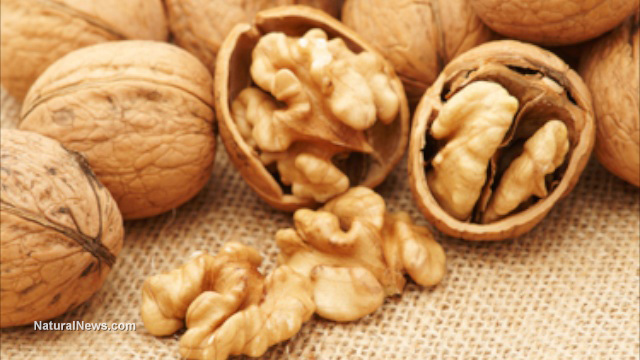Learn about brain health and nootropics to boost brain function
8 Science-backed health benefits of eating walnuts

( Natural News ) Walnuts, with their hard shells, are the healthiest of all nuts and should be eaten as part of a healthy diet. According to researchers from Pennsylvania, walnuts contain the highest concentration of antioxidants among known nuts.
Dr. Joe Vinson from the University of Scranton discovered that a handful of walnuts contain twice as many antioxidants as a handful of any other commonly eaten nut. This makes walnuts excellent sources of beneficial, naturally occurring chemicals that can fight oxidative stress.
Here are eight more reasons why you should eat walnuts every day. Walnuts support liver detoxification
Loaded with omega-3 fatty acids, the master antioxidant glutathione and the amino acid arginine, walnuts can cleanse your liver naturally by detoxifying ammonia. Because they help increase blood circulation, walnuts speed up the delivery of toxins to the liver, the organ that facilitates their elimination from the body.
According to a study published in the Biomedical and Pharmacology Journal , the arginine in walnuts has immune-supporting effects , especially under catabolic conditions. Arginine also helps in the treatment of liver disorders, such as liver cirrhosis and fatty liver disease. Walnuts support heart health
Walnuts are rich in nutrients that are great for your heart, such as omega-3 fatty acids, vitamin E, folate and magnesium.
The healthy omega-3 fats , more specifically alpha-linolenic acid, present in walnuts can help raise your good cholesterol levels, lower bad cholesterol and prevent the development of erratic heart rhythms. Eating walnuts regularly has been proven to help reduce inflammation in the arteries, which can prevent heart disease.
In a study published in the journal Nutrition, Metabolism & Cardiovascular Disease , researchers found that walnut eaters have a better heart disease risk profile , including a smaller waist circumference and lower body mass index, blood pressure and blood triglyceride levels, than non-walnut eaters and those who eat other nuts. Walnuts support brain health
Walnuts are known as “brain food,” but it is not only due to their brain-like shape. Walnuts are rich in healthy fatty acids, iodine and selenium that can improve brain function.
Studies have shown that walnuts can also reduce inflammation in the brain , which is linked to the development of neurodegenerative diseases like Alzheimer’s.
According to a study published in the journal Nutrients , the addition of walnuts in one’s diet helps reduce the risk of mild cognitive impairment and neurodegenerative diseases. Walnuts can keep your gut healthy
Studies suggest that if your gut is rich in health-promoting microbes, you’re more likely to have a healthy gut, a strong immune system and good overall health. Eating walnuts may be one way to support a healthy gut microflora.
A randomized controlled trial published in the journal Nutrients found that consuming 1.5 ounces (43 grams) of walnuts every day helps increase beneficial gut bacteria that butyrate, a short-chain fatty acid that nourishes your gut and promotes good gut health. Walnuts fight cancer
Test-tube, animal and human observational studies, including one published in the journal Gynecologic and Obstetric Investigation , show that walnuts are great at fighting cancer due to their antioxidant properties , which give them the ability to protect the body against breast, colon and prostate cancer.
A study published in the journal Critical Reviews in Food Science and Nutrition reported that walnuts are rich in ellagitannins, which certain gut microbes can convert to compounds called urolithins. The anti-inflammatory properties of urolithins can help lower your risk of developing colorectal cancer. Walnuts can help you lose weight
Research has found that eating a handful of walnuts every day can help stimulate fat loss and promote a healthy weight. Walnuts are known for their ability to suppress appetite , thanks to the presence of omega-3 fatty acids, plant sterols, protein and fiber that help curb hunger. (Related: Walnuts reduce hunger and cravings by changing your brain .)
A study published in the journal Diabetes, Obesity and Metabolism also found that walnut consumption increases the activation of the insula , a brain region involved in appetite and impulse control, to help curb appetite when you see “highly desirable” food. Walnuts support blood sugar control
Walnuts are diabetes-friendly nuts , being low in carbohydrates that could elevate glucose levels. On the other hand, walnuts are high in fiber, protein and healthy fats that could help prevent blood sugar spikes, says dietitian-nutritionist Cheryl Mussato, founder of Eat Well to Be Well in Osage City, Kansas. Walnuts strengthen your bones
Walnuts are a great source of copper, which can neutralize superoxide radicals produced during bone resorption. Walnuts are also rich in magnesium, which improves bone mineral density, and manganese, a co-factor for several enzymes involved in bone formation. The best way to eat walnuts
Walnuts can be eaten directly from their shell. You can soak them overnight and eat them first thing in the morning. Soaking eases digestion, lowers the level of phytic acid in walnuts and promotes metabolism and nutrient absorption.
As nutritious as walnuts are, you don’t need to eat a lot to experience their benefits. Moderate consumption of walnuts has been shown to be the best way to enjoy all the wholesome goodness this superfood has to offer. Snack on seven to 10 walnuts per day or add them to your favorite recipes to stay healthy.
Watch the following video to learn how walnuts can keep your gut healthy . Keep your gut healthy with walnuts
This is a modal window.
No compatible source was found for this media.
This video is from the Natural News channel on Brighteon.com . More related stories:
Eating walnuts found to protect the colon from cancerous tumors . Walnuts are a delicious way to take care of your heart . Help manage stress, blood pressure with walnuts . Sources include: BBC.com BiomedPharmaJournal.org NMCD-jounral.com NCBI.NLM.NIH.gov PubMed.NCBI.NLM.NIH.gov 1 PubMed.NCBI.NLM.NIH.gov 2 PubMed.NCBI.NLM.NIH.gov 3 NDTV.com Wiley.com EverydayHealth.com HealthierSteps.com Brighteon.com
Read more at www.naturalnews.com